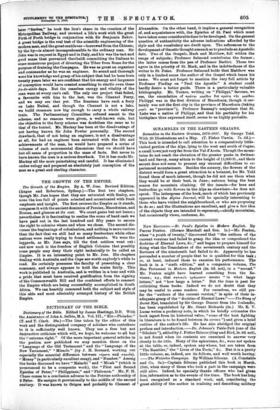DICTIONARY OF THE BIBLE.
Dictionary of the Bible. Edited by James Hastings, D.D. With the Assistance of John A. Selbie, M.A. Vol. III., " Kir—Pleiades." (T. and T. Clark. 28s.)—The line taken by the editor of this work and the distinguished company of scholars who contribute to it is sufficiently well known. They use a free but not destructive criticism which will, we hope, be welcome to all but the "extreme right." Of the more important general articles in the portion now published we may mention those on the "Language of the Old Testament" and the "Language of the New Testament," " Miracle " (by J. H. Bernard, working out especially the essential difference between vipara and anasia),
Money" (a particularly excellent essay), and "Number." Among the books discussed we have "Malachi" and " Micah " (which is pronounced to be a composite work), the "First and Second Epistles of Peter," "Philippians," and "Philemon." Mr.. F. H. Chase comes to a conclusion adverse to the Potrine authorship of 2 Peter. He assigns it provisionally to the middle of the second century. It was known to Origen and probably to Clement of Alexandria. On the other hand, it implies a general recognition of, and acquaintance with, the Epistles of St. Paul which must have taken some considerable time to be developed. On the general question of authenticity the adverse indications afforded by the style and the vocabulary are dwelt upon. The references to the development of Gnostic thought are such as to preclude an Apostolic date. Two of the Gospels, Mark and Matthew, fall within the range of subjects ; Professor Salmond contributes the former ; the latter comes from the pen of Professor Bartlet. These two agree in the priority of St. Mark, and in the indebtedness of the writer to St. Peter. Professor Salmond holds that Matthew was only in a limited sense the author of the Gospel which bears his name. We must not forget to mention the very full article by Professor Findlay on "Paul the Apostle." A student could hardly desire a better guide. There is a particularly valuable bibliography. Mr. Turner, writing on "Philippi," favours, we
see, the emendatiou of irpcLves p.epibos for T775 TO' pepiaos. Philippi was in the first division of Macedonia, though it cer- tainly was not the first city in the province of Macedonia (taking p.epis as "province"). Professor Ramsay's conjecture that St. Luke was a native of Philippi, and that his partiality for his birthplace thus expressed itself, seems to us highly probable.






















































 Previous page
Previous page